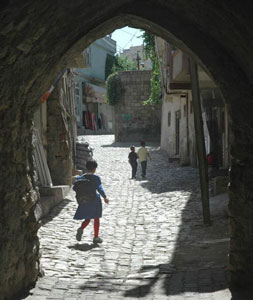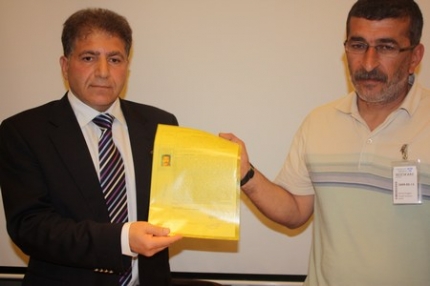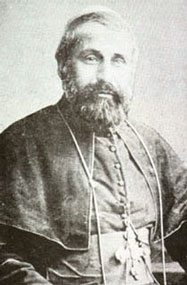|
Siirt is now a predominantly Kurdish town in southeastern Turkey. Till 1915 however it was the hometown of a large Christian population. That year Ottoman Turkey started a holy war against the 'infidels'. Terrible massacres took place in Siirt and the local Christians were brutally murdered. The Year of the Sword - 1915. It is old history now. Who still cares about it after all those years? One particular Kurd from Siirt does care. He is a decent man with a heavy burden on his conscience. How to regain peace of mind with a grandfather who was one of the perpetrators of the gruesome crimes? Grandson Behzat Bilek found a solution.
It happened in 1915 in Siirt, a small town in southeastern Turkey. Four Kurdish men gathered a group of Christian women in the cathedral’s yard. The husbands and male relatives of these women had already been butchered. The four Kurds pointed their weapons at the women while forcing them to carry out all the books they could find in the cathedral’s library and pile them up on the yard. Quickly, the yard was full with books lying on top of each other. When the library was emptied, one of the men took out a match and put the books on fire. One of the other men closed the gate to the yard as the other men gripped and pulled the women’s frightened children from their arms and threw them into the fire. The mothers instinctively rushed to save their children, as the men opened fire and shot the women who fell into the flames. The men didn’t stop piling up the women in the big fire until all women were dead. In the yard, there were now only ashes left. A ten-year-old girl survived the massacre and became the only eyewitness of this terrible crime.
 Siirt - street in the old town center
Crime and Penance
Seyfo Center is a lobby-organization in Holland with members and offices all over the western world. Seyfo is the Assyrian word for sword and the name Assyrians use in reference to the genocide during the First World War. Sabri Atman, chairman of Seyfo Center, is a Swedish citizen. This is why in May 2009 the official hand over of the title deeds of Behzat’s property was held in the Swedish parliament. It was a very emotional ceremony. Many of the people present couldn’t hold back the tears, including Behzad himself. Behzat: ‘Finally, I can relax and let go. From the time I made my decision till the time it was done, it has been very difficult for me. My wife, who is an attorney, has supported me the most. Our biggest concern is our ten-year-old daughter, who tells me that she doesn’t want to live without a father. Up until now, I have only received positive reactions, but I also know that my actions have made me some enemies as well.’
 Behzat Bilek (right) handing over the title deeds of his land to Sabri Atman
An official hand over of title deeds is one thing, but how it is going to happen in practice and what if Sabri Atman decides to sell the land? Behzat firmly sticks to his action: ‘We are talking about 5000 hectare that will be divided among ten people, my nine brothers and sisters and Sabri Atman. Sabri will get my share. How and when, I don’t know. The future will tell. All I know is that I feel happy. I feel that I have made history, and I hope that my action will contribute to recognition of the genocide.’ Behzat has done something great. After all, it is the symbolic value that counts. Most Kurds, and Turks for that matter, don’t even know about the genocide. Now it has been confirmed by the grandchild to one of the perpetrators of these atrocities in the town of Siirt where Behzat was born.
Archbishop Sher
 Chaldean bishop Addai Sher
Monsignor Sher himself met a gruesome fate. He was befriended with a Kurdish aga and when the massacres of 1915 started in Siirt, the archbishop fled to a village that belonged to this Kurdish aga. Monsignor Sher went to hide in a cave outside the village. Eventually the Turkish soldiers who were looking for him reached his hiding-place. The archbishop was brought back to the village. He was severely beaten up, sentenced to death and finally executed. This happened in June 1915. Behzat Bilek’s grandfather must have heard about the execution and being one of the perpetrators of the massacres at Siirt, he will certainly have approved of it.
Heroic and honorable
The chairman of Seyfo Center, Sabri Atman, looks relieved, just like Behzat. Sabri has feared that the hand over of the title deeds would be sabotaged. He explains: ‘Of course it is not about the land itself, it is the action. The ceremony in the Swedish parliament is an historic event. It is not just a beginning to recognition of the genocide, it is also a first step to reconciliation. Up till now Behzat Bilek was known as Berzan Boti, a pseudonym to protect him. Until the last minute before going public about his real identity, Behzat had to keep it a secret because we feared that he would be hurt or that someone would somehow sabotage everything. Now we will see what will happen next. None of us knows how things will develop, but one thing is sure: Assyrians worldwide have gotten a very eagerly awaited recognition. Behzat’s action is heroic and honorable. It is just a shame that the only eyewitness, who was a little girl when she survived the massacre in Siirt, isn’t alive to experience this historical moment.’
Adapted from an article by Nuri Kino, Assyrian and investigative journalist in Sweden (ATH)
|

 Homeland
Homeland  Turkey
Turkey  A man from Siirt
A man from Siirt

 Homeland
Homeland  Turkey
Turkey  A man from Siirt
A man from Siirt